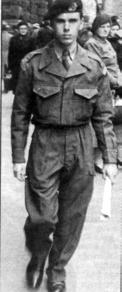Farming in Australia after the War
John Lawson was just 16 when he became one of more than a million 'Ten Pound Poms' who set sail for the promise of a new life in Australia in the decades after World War Two.
Accepting an offer of assisted passage to Australia, where applicants paid just £10 to emigrate, the immigrants helped plug the skills gap in the Australian labour market between the 1940s and 1970s and was one of the biggest migrations of the post-war era.

John Lawson, a grandfather who lives in Kempton Walk, Shirley, went to Australia under the Big Brother Movement, a two-year programme which saw thousands of British youths go to Australia to work, mostly, as farm labourers.
He remembers saying goodbye to his parents in 1948. "I was one of 16 boys who set sail on board a cargo motor vessel with 100 passengers from Liverpool," said John, 73. "As we travelled down the west coast of England I remember watching Penzance disappear from view and I wondered when, or if, I would next see my country again.
"We landed at Perth first and did all the ports right round to Sydney; Adelaide, Melbourne, Hobart."
The 16 would be farmers were transported to a training camp where they learned specialist skills for a month before they were split up and sent to work as farm hands.
"We were so excited when we arrived in Sydney, with great expectations of a new life in Australia. But that feeling was short lived once work started on the farms and it turned out to be a very lonely time for me."
John found himself on a remote farm 40 miles outside Sydney with barely any contact with his employers. His only company was a herd of pigs he was given responsibility for. "They stank," said John. "You can imagine what pigs smell like normally, but in 116 degrees heat it was awful.
"I usually ate alone. On rare occasions I could eat in the kitchen after the family had finished in there.
"Not having any human contact made me very depressed and this reflected in my work. I didn't last very long and I was soon moved to another farm."
John spent the next two years working on a dairy farm where his working conditions improved slightly. When his two year obligation finished John joined his older brother Rex and his mother, who had also emigrated to Australia. It had been two years since he had seen his mother, who was divorced from his father, and the family moved to Brisbane to start their new life.
John returned to the UK in 1959, after 11 years, because his mother was homesick. They settled in Dingwall Road, Croydon, and John has remained here ever since. He added: "Despite my loneliness I actually had some very happy times in Australia. It was odd coming home. Things had changed so much, but then I met my wife, Edna, and the rest is history."
